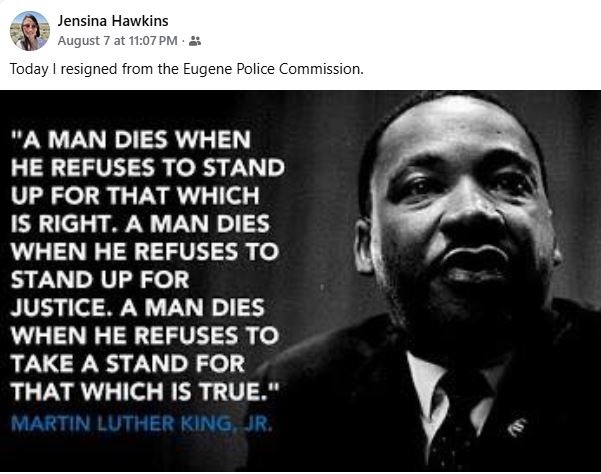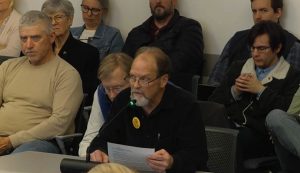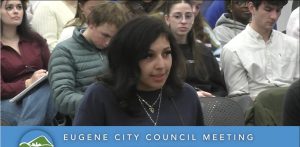Jensina Hawkins tells KEPW’s Underground Echo why she resigned from the Police Commission
11 min read
Presenter: The former chair of the Eugene Police Commission tells KEPW’s Echo why she resigned. The full interview will be broadcast on Underground Echo at 6 p.m. Wednesday. With the backstory, here’s Echo:
Echo (KEPW, Underground Echo): For more than a year, Jensina Hawkins raised alarms about the conduct of another police commissioner whose words and actions she wrote were ‘alienating, offensive, and intimidating.’ City leadership, she says, knew, and yet, despite workshops, pleas for guidance, and repeated warnings, the city remained quiet. The silence was not neutral. It was enabling.
[00:00:38] On Aug. 7, 2025, Hawkins resigned. It was, she wrote, a bitter disappointment but she could not serve in good conscience with a structure that refused to condemn harassment and harm. And I quote: ‘I cannot serve or represent an organization that does not also identify and condemn interactions that cause emotional and mental harm to fellow organization volunteers, appointed support staff or concerned public bystanders.’
[00:01:10] Here today is Jensina Hawkins herself. Walk us through your journey on the Police Commission from 2022 to 2025.
[00:01:18] Jensina Hawkins: You know, I was actually invited to apply for the Police Commission by a friend who was serving on the Commission, and he had texted me and let me know there was a vacancy and thought I should apply.
[00:01:28] And I thought it sounded like fun, had no idea what exactly I was getting into, but I applied and was appointed by Mayor (Lucy) Vinis and the City Council at that time.
[00:01:39] I was incredibly honored to join the Commission. I had perfect attendance even when I had COVID, when my mother passed away, when I was traveling back from an airport, I never missed a single meeting. And it was one of the hugest honors of my life to be able to work with the Eugene Police Department and the city of Eugene to edit and create police policies and procedures that reflect the values of our community.
[00:02:08] Echo (KEPW, Underground Echo): At what point did you realize resignation was your only option?
[00:02:13] Jensina Hawkins: I am the wife of the president of Eugene Springfield NAACP. And sitting by quietly and allowing marginalized populations to be further othered or eliminated or undermined is not something that either my husband or I are prepared to do.
[00:02:36] And because it was clearly not going to be addressed by the city and because in fact, I received some—it felt like a slap on the hand for trying to provide some correction—it got to the point where I was no longer willing to have my name associated with an organization that was going to allow and enable that behavior.
[00:03:00] For me, it was a line in the sand. It was: This is exactly where I stand, where my values and my belief system hold me, and it appears to be on a different side of that line than where the city of Eugene claims they are, and yet where they actually chose to dig in their heels.
[00:03:17] My feeling was that the behavior of any commissioners would continue and there was always a maelstrom of opinions and things that happen when you put a body of 12 people together. But for the indecorum, I had decided that that was no longer going to be on my watch.
[00:03:36] Echo (KEPW, Underground Echo): How many times did you raise concerns about the commissioner’s conduct?
[00:03:40] Jensina Hawkins: I would say at least a dozen times to different outlets. It was to city leadership. It was to the staff liaison supporting the Police Commission, and also in some conversations with some of the other city officials.
[00:03:52] Echo (KEPW, Underground Echo): How did the city respond or fail to respond?
[00:03:57] Jensina Hawkins: I think the general impression that I received was that it’s just how some people are. There’s a lot of valid questions, of course, about how much a person’s exposure to certain things could shape their impression, shape their perception of how things should be addressed.
[00:04:19] It was— The failure to respond came in mostly when I was asking for very specific guidance on how to protect a commissioner under my watch, because I felt very much like a mother hen apparently, that I wasn’t supposed to. But I wanted to protect somebody that I saw as a vulnerable population that was being intimidated and had expressed discomfort and had also said that they felt that they would have to resign because they didn’t feel safe anymore being on the Police Commission.
[00:04:52] Echo (KEPW, Underground Echo): What reforms would’ve made it possible for you to stay?
[00:04:55] Jensina Hawkins: I would’ve welcomed an opportunity to actually collaborate with the city manager’s office. Most of the communications with the city went through the staff liaison to the city manager’s office, and then back from the city manager’s office through the staff liaison to me as the chair.
[00:05:12] There’s some very strict guidelines within the boards and commissions that we are not usually to reach out to the city manager’s office ourselves, all of the communication is supposed to be conducted through our staff liaisons. And that sometimes is problematic in not necessarily knowing how the requests are being interpreted back and forth.
[00:05:35] Echo (KEPW, Underground Echo): Right. Well, it’s like the telephone game when you’re young.
[00:05:38] Jensina Hawkins: Absolutely like that.
[00:05:40] Echo (KEPW, Underground Echo): What can you tell us about the behavior that was offensive?
[00:05:48] Jensina Hawkins: I observed a person being very aggressive and intimidating, and dismissive and disrespectful, particularly to a person of color who identifies as non-binary. It’s amazing how things, such as pronouns, you would, some people consider that to be a very simple thing, but pronouns can really matter to the person who is requesting that they be respected.
[00:06:18] And so things like that being dismissed and overlooked consistently, and I think for me what really stood out as offensive was the refusal to correct behavior that had been pointed out as harmful.
[00:06:36] And so, you know, the first time something happens, I tend to always want to give people the benefit of the doubt and say, ‘Well, maybe they didn’t understand.’ I’ve certainly been caught in situations when I didn’t understand how my tone or my behavior affected somebody else. And I am usually grateful when somebody points that out and provides the education to me, so I can do better.
[00:06:57] In this particular case, the education was provided and the person did apologize, say that they had meant no ill intent, and we certainly accepted that and moved on from there. But there was not a correction of the behavior.
[00:07:13] Echo (KEPW, Underground Echo): I see. Do you think this culture of silence is intentional or negligent?
[00:07:21] Jensina Hawkins: I think it’s probably somewhere in the middle because it’s comfortable—when you live with something for so long you become kind of nose-blind to it. And so it’s like those Febreze commercials, you know: You walk in and it probably smells bad to somebody else, but you’re so used to it, it’s just home to you.
[00:07:38] Echo (KEPW, Underground Echo): What message does this send to future commissioners, though?
[00:07:41] Jensina Hawkins: ‘We certainly want you to step up. We want you to volunteer and we want you to provide a voice, but don’t ask questions. Don’t push against authority. Don’t point out the cracks on the sidewalk because you’re here to give us the words and we really, really care about words. But don’t point out the areas where actions need to happen.’
[00:08:00] Echo (KEPW, Underground Echo): And words without actions are really just nothing. It’s lip service.
[00:08:05] Jensina Hawkins: And in a lot of cases they’re even more insulting.
[00:08:08] Echo (KEPW, Underground Echo): Yeah, that’s the truth. You’ve said most community members supported your decision. What kind of support did you receive?
[00:08:16] Jensina Hawkins: Some folks had been peripherally aware of the struggles that I was going through, and so they were regretful that it came to that point, but respected the fact that I took a stand.
[00:08:29] At the same time as publishing my resignation, I also made a social media post that I am a Christian and a Republican. I figured I might as well get all my dirty little secrets out there in the public. And I received a lot of folks saying: ‘Be you, hold true to yourself, follow your moral compass, and it doesn’t change how we feel about you. It doesn’t change how you’re perceived in the community.’ And it was very empowering and uplifting to receive that support.
[00:08:57] There were some who were disappointed in the way that I chose to do it, and that’s understandable. Former Vice Chair (Sean) Shivers has commented to the media that he felt I had other options. And my response to that is that my timing of it had to do with the fact that I was not willing to go through another meeting with somebody behaving in a way that was detrimental to others and have that meeting attributed to my being the chair.
[00:09:25] Echo (KEPW, Underground Echo): So how did the media coverage frame the story, and what did they miss?
[00:09:32] Jensina Hawkins: I think that several people from reading the news articles feel that I took a stand on respecting somebody’s pronouns. And while I certainly think that’s a lot of it and I think that respect of people in general is a lot of it at the heart of the story, it’s about me really protesting an organization that claims that they stand for one thing, but showed that they really don’t.
[00:10:03] Echo (KEPW, Underground Echo): So kind of what I hear you saying is there’s not really an established system of checks and balances.
[00:10:08] Jensina Hawkins: That’s exactly right.
[00:10:09] There’s a couple minutes of belonging training, which goes in with those city core values, but there’s really nothing that says: ‘We are the city of Eugene. We expect everybody to behave like decent human beings. And if your behavior is interpreted in an offensive manner, then here are corrective actions. Here are the things that will happen if your behavior is detrimental to others.’
[00:10:32] The leadership as in the chair and the vice chair are not empowered to provide any correction. And there’s really no expectation other than what’s provided in that very basic one-hour onboarding. There’s really no expectation of how people are expected to act towards community members or towards the staffers who are supporting them or just towards any interested bystanders.
[00:10:55] Echo (KEPW, Underground Echo): So during your tenure, the commission debated surveillance technologies like Flock cameras.
[00:11:01] Jensina Hawkins: We also covered the Guardian camera trailers and we spent several months discussing a policy for those, and it was very eye-opening for me. Personally, I don’t have an issue with either one of those things, but by having the voice of the community brought to the table, I am able to appreciate that other people have other experiences and other concerns that, in my position of privilege as a cis straight woman, I don’t have those experiences. I don’t have those fears. But that doesn’t undermine or invalidate the concerns that other folks have.
[00:11:36] Echo (KEPW, Underground Echo): What risks does Eugene face if these issues remain unaddressed, in your opinion?
[00:11:41] Jensina Hawkins: I worry that other quality folks will be driven away. The commissioner that resigned prior to my resignation brought a very valuable viewpoint to the Police Commission as a person of color, as someone who identifies with the LGBTQIA community. And those voices are incredibly important. Otherwise, we sit in an ivory tower and we tell the chief of police that we think everything looks great from where we’re sitting.
[00:12:06] But if we don’t have that other perspective, then I feel that we’re doing ourselves and our community and our officers a disservice.
[00:12:15] Echo (KEPW, Underground Echo): What reforms are most urgently needed in your opinion?
[00:12:20] Jensina Hawkins: I think that a better understanding could be provided to new volunteers as far as where they are expected to raise their voices and where their voices really are more detrimental than not. I would really encourage the city to provide a lot more comprehensive training and to also build in some accountability. If folks cannot attend a training at a certain time, offer some flexibility or a recording where we can track if somebody actually attended the training.
[00:12:55] I asked at one point for the city to provide ‘Belonging’ training to the Police Commission, and they were unable to do that. And as particularly if a chair, if a leader is reaching out for resources to support members of their team, I really wish that the city would lend more credence to those requests.
[00:13:14] It’s always going to feel like a personal failure to me that a commissioner left the Police Commission because they felt unsafe and that was on my watch. And the fact that I was unable to get them resources, the fact that I was unable to stop somebody from attacking them, and the fact that I was unable to do whatever it took to make them feel safe and supported, really felt personal to me as a leader and as the face and the voice of the Police Commission.
[00:13:46] I really hope that in the future there’s more options and that maybe commissioners are aware of places they can go or resources that are available to them. You know, the city, government jobs in particular are known for having wonderful benefits and all sorts of reasons for things, and those benefits don’t apply to volunteers unfortunately.
[00:14:10] Echo (KEPW, Underground Echo): What is next for you in terms of civil service?
Jensina Hawkins: I am currently the vice chair of Churchill Area Neighbors. It’s one of the formally recognized neighborhoods in the city of Eugene, and I am co-chair of Neighborhood Leaders Council, which is not formally recognized by city of Eugene. And so I will finish out my terms there. And it’s possible that after the completion of those terms, I will step away from city of Eugene service altogether and maintain a presence in the nonprofit sector.
[00:14:41] Echo (KEPW, Underground Echo): If you could send one unfiltered message to Eugene City’s leadership right now, what would it be?
[00:14:47] Jensina Hawkins: If it was going to be completely unfiltered, I would say that: It was so disappointing to me. I loved doing the Police Commission and doing that work, taking on the leadership and learning so much about our police department and some of the things that they face chairing.
[00:15:05] So chairing the Law Enforcement Mental Health and Wellness Subcommittee was a huge honor and learning so much and having officers be willing to open up and share some of their stories and their perspectives with me, realizing how much that they go through that most of us will hopefully never, ever, ever, undergo largely because we have a police force.
It was such an honor to be a part of all of that, and so it is very regretfully and with so much bitter disappointment that I’m stepping away from it because it really, other than the business that I started and the kids that I have, it was probably the thing I’ve poured myself heart and soul into the most.
[00:15:49] This really is a thing about the city of Eugene. It’s not about one commissioner, it’s not about pronouns even though all of those have become collateral damage. It is so important to hold the powers-that-be accountable for the words that they say. The things that they say are really important to them: It’s our job to hold them accountable to that.
[00:16:11] Presenter: Jensina Hawkins explains why she resigned from the Police Commission, in a discussion with Echo from KEPW’s Underground Echo. You can hear the full interview Wednesday at 6 p.m. right here on 97.3, Eugene’s PeaceWorks Community Radio.




